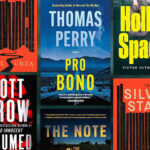
Confessions of a Reluctant Memoirist
Why Has An Entire Genre Come to be Defined by Its Worst Iterations?
About a year ago, I became a memoirist accidentally. Well, that’s not completely true. I did publish a book called Lord Fear: A Memoir, and I did sign off on that “a memoir” subtitle with hardly any feet-dragging or tantrum-throwing. I was even rather pleased with it. My first book had been a piece of immersion journalism about minor league baseball, and its subtitling process lasted months. There were buzzwords that needed to be present, industry standards for my chosen subject matter. I naively insisted that I didn’t need a subtitle at all, and, failing that argument, began to push for one that explained as little about the book as possible. My publisher argued for something more utilitarian, mostly responding to my petulance with remarkable restraint. Compared to that back-and-forth, memoir felt like a luxurious alternative for a nonfiction writer—a catchall of a word, like novel, I hoped, hiding in tiny print, meaning nothing.
In retrospect, I knew that I was lying to myself. The word hasn’t yet reached meaninglessness, even for me. After all, I sat down for the better part of a decade writing a book about my family, the whole time telling myself that I wasn’t writing a memoir—such hoop-jumping rationalization has to be born from something. In my case, it was a combination of insecurity and arrogance—I felt my family’s tragedy was not tragic enough to succeed in a genre judged by its raw material and, obnoxiously, I felt that I was somehow doing more as a writer than simply laying down the sad facts: the and then, and then, and then. I wasn’t focusing on myself, I reasoned. It was really a biography of my brother, a character study of addiction and its aftermath. And there was research, like real reporting! And it employed a fractured, chapter-less format!
Of course, some of my favorite memoirists adopt and embody these strategies in various ways—Honor Moore, Nick Flynn, Jamaica Kincaid, Richard Rodriguez, David Shields, Edwidge Danticat, J.R. Ackerly, Paul Auster. These are the writers I have always wanted to emulate, whose ranks (or at least their very distant orbit) I should feel giddy to have joined. Yet somehow I always felt that their greatness stood outside the form. In adoring reviews of their work, they’re not held up as exemplars of what memoir can mean, but rather as exceptions. Here’s GQ on Flynn’s Another Bullshit Night in Suck City: “In a perverse act of divine intervention, a life worth writing about was bestowed on a man actually able to write.” And here’s how Entertainment Weekly couched its rave: “Unlike like the pity party that too many memoirs have become…”
* * * *
Over a decade after the publication of Flynn’s first memoir, that kind of rhetoric should be long gone, but it still seems as though the best way to praise a memoir is to say that it isn’t like a memoir, and it remains easy to use one book you don’t like as proof of the badness of the whole genre (see recent entries in The New York Times, The New Republic, Jezebel, The Washington Post, The New York Review of Books, etc). To put it bluntly, memoir is the only literary form still defined by its shittiest iterations. Or that’s really not fair — it’s defined by one particular kind of book, that invites one particular, stereotypical kind of conversation.
After you’ve written a memoir, it’s remarkable how free people feel to tell you that their life could be a bestseller if they felt like making it so. These aren’t advice-seeking situations; these are declarations, something akin to walking up to a chef, getting right in her face, and saying, I own a pan.
It’s also remarkable how many post-reading Q&As have revolved, in some way, around questions that prompt me to assess what’s wrong with other memoirs—what do I think of Eat Pray Love culture? Am I personally offended by James Frey? Why does it seem like everyone these days thinks they have a memoir to write? What about Oprah? I have no decent answers to any of these questions, and I hear myself taking cloying pains to somehow distinguish my work from them. I hear myself at every reading saying shit like, “This is a super weird book,” until I feel like a high school goth, so transparent under that scowl.
Almost subconsciously, after the book came out, I began to scour reviews not just for compliments, but for phrases that signaled that the reviewer had discovered I was up to something different than what the book’s cover might suggest. One review called it less of a memoir, and more of a meditation. I held my fists up in my living room like triumphant Rocky—A meditation, Adrian! Not just a memoir; a meditation! Or investigation; I got off on that, too. When a writer I admire told me that she thought the book was more of an essay than a memoir, I was overjoyed.
I understood of the pettiness of these distinctions even as I reached for them. A book’s label shouldn’t matter; I know that. Those who write memoirs, who engage in that broad intellectual and emotional challenge, are well aware that such an attempt can’t be reduced. So when Mary Karr’s The Art of Memoir came out this year, I was hungry for it—a craft book by a master of this particular craft. Its sheer existence should emphasize the complexity that the craft can offer.
Karr begins her book with a familiar admission about her chosen genre: “I feel some lingering obligation to defend it.” This was heartening when I first read it; a legend acknowledging that even she feels the weight of unfair judgment. But then, in the very next paragraph, Karr writes: “[memoir’s] structure remains dopily episodic. Novels have intricate plots, verse has musical forms, history and biography enjoy the sheen of objective truth. In memoir, one event follows another.”
Jesus Christ, Mary, try a little harder with the defense. This is the new rallying cry for memoirists, and in its introduction memoir gets boxed into the tradition of how I spent my summer vacation. Which, in turn, puts pressure on the magnitude of the chronological life lived, provides a set of numbers for all wannabes to paint by. And, inevitably, it leads to responses like this, from Leah Finnegan in The Barnes & Noble Review: “What gives a memoir a right to exist? Do we need more memoirs? Shouldn’t the bar for memoir on the interesting-ness meter be very, very high?”
This is exactly the kind of conversation I never wanted any part of: the formal rigidity and cynical, where’s-the-drama demands that I (and every other young nonfiction writer I know who has been branded a memoirist) actively try to write away from. How can one fashion a writing life out of such work, as opposed to a one-time sum-up of pain?
* * * *
Oddly, this old, limiting definition of the word memoir persists in a literary moment in which the genre’s stylistic tenets—the value of extreme intimacy, the use of the personal to explore the cultural, the potent fault-line between fictional storytelling and authentic self—are more celebrated than ever before. When I think of my two favorite memoirs of the past few years—Maggie Nelson’s The Argonauts and Claudia Rankine’s Citizen—neither of them are technically memoirs. Nelson has earned the right to roll up sans subtitle, Madonna status in the literary world, and Rankine has, twice now, cornered the market on the term American Lyric. I think its significant that, given the option, a writer of personal nonfiction would rather invent a category than deal with the existing one.
Citizen was nominated for two NBCC awards in 2014, neither of which were for memoir. Instead, it was held up as an example of great poetry and great criticism. And it is both of those things, but it’s also a book written primarily in prose, from a distinctly personal perspective (albeit in the second person, though Mary Karr herself once published a memoir entirely in second person, too), often exploring tiny intimacies from the author’s own life. When I saw Rankine speak at last year’s AWP conference, she pushed back at a question that addressed the memoirishness of her work. In a standing-room only auditorium, filled with a lot of young writers who both emulate Rankine and are probably working on a piece of memoir, she made this distinction: her work was not interested in what happened to her, but in using that experience to explore something larger.She was right, of course, but she was also implying that those called memoirists aren’t also interested in a world beyond the self.
Nelson’s The Argonauts just won its own NBCC award in criticism, beating out Ta-Nahesi Coates’s Between the World and Me. Both are truly great books, simultaneous achievements of art and argument, but they stick out rather starkly from their competitors in the category—university press works of scholarship on Elizabeth Bishop and William Blake. Meanwhile, Margo Jefferson’s Negroland: A Memoir won the NBCC award for autobiography, beating out Tracy K. Smith’s Ordinary Light: A Memoir and Vivian Gornick’s The Odd Woman and the City: A Memoir. All three books are staggeringly beautiful, deeply personal narratives, written by bona fide literary legends. Jefferson and Gornick are established critics, Smith is a poet, and the broadness of their intellectual and artistic interests permeates each of their memoirs. These are books about the self and selections of personal history, but that’s not all that they are. So what separates Nelson and Coates’s work from them? From where I’m standing, it’s hard not to see the arbitrary distinction as a way of saying their books are…well, better. Or, if not better, at least more.
Nelson herself asserted as much in a recent interview: “I’m interested in the kind of life-writing that’s inexhaustible, i.e., that has little to do with the ‘summing up’ typically indicated by the word ‘memoir.'”
I don’t think that she’s saying she’s not interested in memoirs; in fact, she has championed plenty (and here I’ll admit that a highlight of my writing life was when she said nice things about mine). But the word carries enough meaning for her to push against it.
* * * *
While Nelson’s wonderful brand of nonfictional life-writing is getting its just due, so are works of auto-fiction from writers like Ferrante, Lerner, and Knausgaard. To be sure, the term auto-fiction covers writers working with various balances of auto and fiction, but let’s look specifically at Knausgaard. His My Struggle books revel in their memoirishness, and yet it was a conscious decision not to label them as such—in Norway, the original covers said novel, and in the States his covers makes no claim to any genre, which does a perfectly adequate job of siphoning the literary prestige of fiction.
When the Knausgaard phenomenon first struck, novelist Siri Husvedt emphasized to The New York Times that Knausgaard didn’t write, “The Oprah Winfrey narrative.” The Times then finished that sentence with “so common in recent American memoirs.” I’m genuinely curious: what are these recent memoirs? Why is it so easy (and apparently fact-checkable) to insult an entire genre for the purposes of establishing that one book is superior to that straw man?
My goal here isn’t to argue that writers like Nelson and Rankine should feel obligated to take up a particular label, and I’ve abandoned the fantasy of standing up at a Knausgaard reading and screaming, Say it’s a memoir until some gorgeous, Nordic giant drags me out. I also have no desire to take shots at the kind of memoir that Mary Karr writes and for which she advocates. She’s brilliant, but the style of her particular brilliance should not define a genre. Prose poetry does not negate the value of the lyric; Toni Morrison’s genius doesn’t render Nicholson Baker’s work un-novelistic.
This is an exhilarating time to write personally—a time in which intimate energy feels like a vital, constant part of the literary landscape, and genre boundaries are, at least in the writing practice, increasingly blurred. But the term casually, or commercially, bestowed upon so many of these works is still memoir, the connotation of which has not caught up to everything the genre can encompass. Saying that labels are fluid only works when each label carries equal respect.
At last year’s AWP conference, I was on a panel with two friends who had just learned that their forthcoming books, both multi-faceted, reported projects, would be called memoirs. One friend, a Pulitzer-nominated journalist, said she was still getting used to the idea. At first, it made her nervous—this wasn’t the tradition she’d ever seen herself working in. But then she thought, no, there are so many memoirs that she loves, that seem both like her work and miles apart from it. She would adopt the term and do a beautiful job of it. I know that she will. And I hope that the word won’t matter, that it will be small on the cover, fading away, carrying no baggage, allowing the reader to simply experience a great book.
Lucas Mann
Lucas Mann was born in New York City and received his MFA from the University of Iowa. He is the author of Lord Fear and Class A: Baseball in the Middle of Everywhere. His latest book, Captive Audience, will be published in the US by Vintage in May 2018. His essays have appeared in Guernica, BuzzFeed, Slate, and The Kenyon Review, among others. He teaches creative writing at the University of Massachusetts, Dartmouth and lives in Providence, Rhode Island with his wife.



















